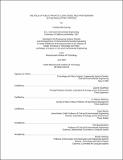The role of public-private clean diesel R&D partnerships in the regulatory process
Author(s)
Ng, Christine Bik-Kay, 1979-
DownloadFull printable version (656.5Kb)
Alternative title
Role of public-private clean diesel research and development partnerships in the regulatory process
Other Contributors
Massachusetts Institute of Technology. Dept. of Civil and Environmental Engineering.
Advisor
Joanne Kauffman and D. Eleanor Westney.
Terms of use
Metadata
Show full item recordAbstract
This research considers the influence that public-private clean diesel R&D partnerships have on emission regulations in the U.S. While there is substantial literature on the contribution of public-private R&D partnerships to facilitating organizational learning, innovation, and national competitiveness, there has been little research on its influence on environmental policy and rulemaking. Understanding whether partnerships are influential in the regulatory process, and the conditions under which they are influential, will increase awareness of the potential regulatory impacts of future partnerships. This research focuses on the effects of such partnerships on U.S. Environmental Protection Agency (EPA) rulemaking with respect to diesel fuel quality in heavy-duty vehicles. Diesel exhaust contains air pollutants such as particulate matter and nitrogen oxides, which have adverse human health and environmental impacts. For this reason, the heavy-duty diesel industry in the U.S. has been subject to increasingly stringent federal emission regulations. The EPA sets technology-forcing standards in order to drive industry progress in emissions reduction. Since the EPA bases its rulemaking largely on its appraisal of technological development in industry, technologists in companies and research organizations play an important role in providing the EPA with timely technical information. A comparative analysis of three public-private partnerships, all of them including several industry and government partners, formed the basis for a comparative case study. The partnerships investigated the effects of diesel fuel quality, particularly sulfur levels, on emissions reduction. Publicly available documents, interviews, and questionnaires provided insights on the three partnerships and public-private partnerships in general. The comparative analysis reveals that public-private partnerships do play a role in influencing policy, but that role is limited by the circumstances of each partnership and regulators' preference to rely more on other sources of knowledge for technical input. A clear understanding of upcoming regulations, broad stakeholder involvement, and the generation of publicly accessible results are all critical to a partnership's potential regulatory influence. Partnership results can directly provide input to a regulatory decision, but its effects on technological progress, knowledge networks, and further research collaboration are also relevant to the regulatory process.
Description
Thesis (S.M.)--Massachusetts Institute of Technology, Engineering Systems Division, Technology and Policy Program; and, (S.M.)--Massachusetts Institute of Technology, Dept. of Civil and Environmental Engineering, 2003. Includes bibliographical references (p. 163-180). This electronic version was submitted by the student author. The certified thesis is available in the Institute Archives and Special Collections.
Date issued
2003Department
Massachusetts Institute of Technology. Department of Civil and Environmental Engineering; Massachusetts Institute of Technology. Engineering Systems Division; Technology and Policy ProgramPublisher
Massachusetts Institute of Technology
Keywords
Technology and Policy Program., Civil and Environmental Engineering.